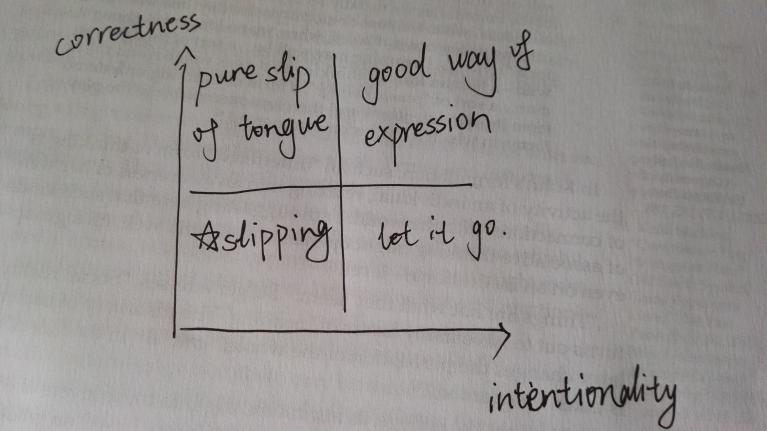September 17, 2016 - 11:53

To define slipping, I think there are two factors that matters most: correctness and intentionality.
The first one, correctness, which is about the basic definition of slipping: whether or not it is a misspeaking. If a person says something perfectly correct, politely, with no offend to others, it’s just a successful process of expressing his or her idea, definitely not a slippage. Some subtle mistakes that do not challenge the whole idea of one’s word are not count as incorrect here.
And the way to evaluate if a misspeaking is slippage, is its intentionality. If a person says something wrong or offend others by accident, that is a slippage. But if not, if it’s on purpose, it is definitely not a slippage---- The words are not slipping from his or her mouse, but swaggering.
To make it more clear: there are four combinations of correct, incorrect, intentional, and unintentional: correct and intentional, correct but unintentional, incorrect but unintentional, and incorrect and intentional. I name this four: good way of expression, pure slip of tongue, slipping, and let it go.

If what a person says something wrong unconsciously (without bring the challenge of view, which I believe makes this kind of saying still count as correct), it’s simply just a slip of tongue, without any serious outcomes. In June Jordan’s essay, when she expressed that she doesn’t care what her room cleaner Olive think about her at all, she gives a rhetorical question, “And why should she give a shit about mine unless I do something, for real, about hers?” The word “shit”, here, though a little inelegant, but it just doesn’t matter. I take this one as a pure slip of tongue.
If it’s a misspeaking but on purpose, I call it ‘let it go’, because it’s hard to make a judgement on such misspeaking. It can be as subtle as no one cares, or it can be as serious as hurt one’s feeling or even change his or her life (like what Free Rein said in her online post this week). When I hear this kind of words, I may frown a little bit, but just let it go, anyway. If a person says something intentionally but acceptable and with no offend, that’s a successful process of expressing his or herself.Then, the last one, a misspeaking without conscious control, a slip of tongue but is wrong in some way or offend others, or even surprises the speaker his or herself, that’s what I think slipping is. It can not only be words, but also body language, face expressions and so on.
All slipping reflect people’s true thoughts. Though they’re unintentionally, what people say can definitely indicate what people think. By ‘true thought’, I do not mean the person’ belief, it’s too serious to use the word belief. It only refers to the person’s thought at that moment. If he or she maintain what this thought, it can be everlasting, or it can just last for a few minutes---- it’s easy for a person to change mind and correct the thought at any time. According to psychologist, no slip of tongue is a coincidence, it’s the reflection of subconscious minds. And through this process, one can explore his or her real inner world and get deeper understanding of his or herself.
June Jordan’s whole thinking process is actually just the process of slipping. During her whole travel in Bahamas, she always had new thoughts about race, gender, class and the connection between people. And that process of slipping gives her chance to explore new thoughts and refresh her old views. At the beginning of this trip, she’s still a little confused about why people in the same race could have such huge difference. But at the end, she came to the conclusion that “Yes: race and class and gender remain as real as the weather. But what they must mean about the contact between the two individuals is less obvious and, like the weather, not predictable.” And “It is not only who you are, in other words, but what we can do for each other that will determine the connection.”
That’s why at the end of her journey she said that “I have rested, here, in the Bahamas, and I’m ready to return to my usual job, my usual work. But the skin on my body has changed and so has my mind.”
That’s what I think the charm of slippage is.
